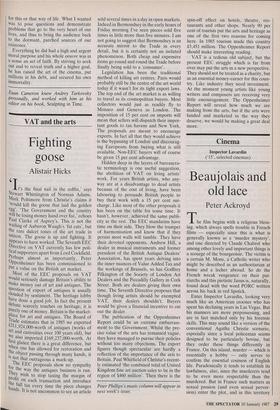VAT and the arts
Fighting goose
Alistair Hicks
Most of the EEC proposals on VAT would seriously damage Britain's ability to make money out of art and antiques. The question of export of antiques is usually Clouded by sentiment. The heritage lobby have done a good job. In fact the present debate scarcely touches on heritage; it is Purely one of money. Britain is the market- Place for art and antiques. The Board of Trade estimates that in 1985 we exported L311,924,000-worth of antiques (works of art and curiosities over 100 years old), but we also imported £169,237,000-worth. At first glance there is a great difference, but When one has allowed for restoration and the object passing through many hands, it Is not that outrageous a mark-up. , The EEC proposals show no sympathy tor the way the antiques business is run. TheY wish to stop taxing the margin of Profit on each transaction and introduce 1.1e full tax every time the piece changes hands. It is not uncommon to see an article sold several times in a day in open markets. Indeed in Bermondsey in the early hours of Friday morning I've seen pieces sold five times in little more than five minutes. I am not going to suggest that Bermondsey is an accurate mirrdr to the Trade in every detail, but it is certainly not an isolated phenomenon. Both cheap and expensive items go round and round the Trade before finally being sold to a 'consumer'.
Legislation has been the traditional method of killing art centres. Paris would probably still be the centre of the art world today if it wasn't for its tight export laws. The top end of the art market is as willing to travel as its cosmopolitan buyers. Most collectors would just as readily fly to Monaco and Geneva as London. The imposition of 15 per cent on imports will mean that sellers will dispatch their impor- tant goods to tax havens and New York. The proposals are meant to encourage exports. In fact all that they would achieve is the bypassing of London and discourag- ing Europeans from buying what is still available. Non-EEC buyers will of course be given 15 per cent advantage.
Hidden deep in the layers of bureaucra- tic terminology is one useful suggestion, the abolition of VAT on living artists' work. For years British artists, who any- way are at a disadvantage to dead artists because of the cost of living, have been labouring to persuade British people to buy their work with a 15 per cent sur- charge. Like most of the other proposals it has been on the table for some time. It hasn't, however, achieved the same publi- city as the rest. The EEC mandarins have time on their side. They blow the trumpet of harmonisation and know that if they persist most walls will tumble. They have their devoted opponents. Andrew Hill, a dealer in musical instruments and former president of the British Antique Dealers' Association, has spent years delving into the inner nuances of Value Added Tax and the workings of Brussels, so has Godfrey Pilkington of the Society of London Art Dealers and the Piccadilly Gallery in Cork Street. Both are dealers giving their own time. The Seventh Directive proposes that though living artists should be exempted VAT, their dealers shouldn't. Buyers would be given a financial incentive to cut out the dealer.
The publication of the Oppenheimer Report could be an extreme embarrass- ment to the Government. Whilst the pre- cise value of the arts has remained vague, they have managed to pursue their policies without too many objections. The export figures though spectacular are hardly a reflection of the importance of the arts to Britain. Paul Whitfield of Christie's recent- ly estimated 'the combined total of United Kingdom fine art auction sales to be in the region of $460 million'. Then there is the Peter Phillips's music column will appear in next week's issue. spin-off effect on hotels, theatre, res- taurants and other shops. Nearly 90 per cent of tourists put the arts and heritage as one of the first two reasons for coming here. In 1985 tourism made this country £5,451 million. The Oppenheimer Report should make interesting reading.
VAT is a tedious old subject, but the present EEC struggle which is far from over may put the arts in a new perspective. They should not be treated as a charity, but as an essential money-earner for this coun- try. Like industry they need investment. At the moment young artists like young writers and composers are receiving very little encouragement. The Oppenheimer Report will reveal how much we are making from the arts, but if the arts were funded and marketed in the way they deserve, we would be making a great deal more.










































 Previous page
Previous page